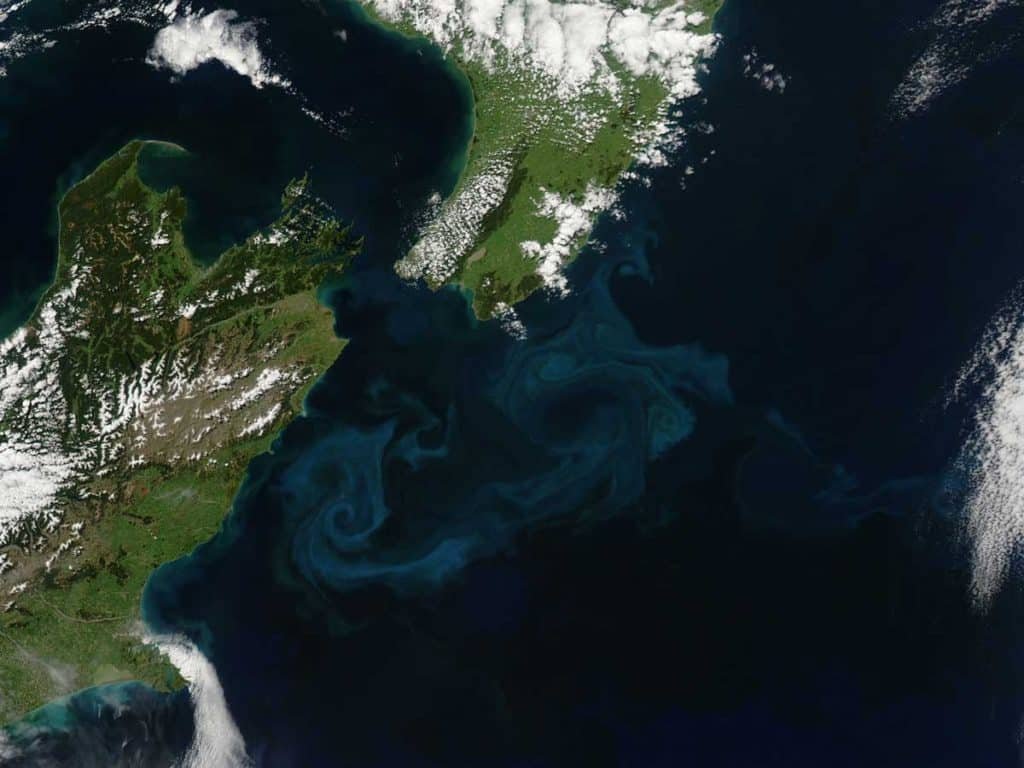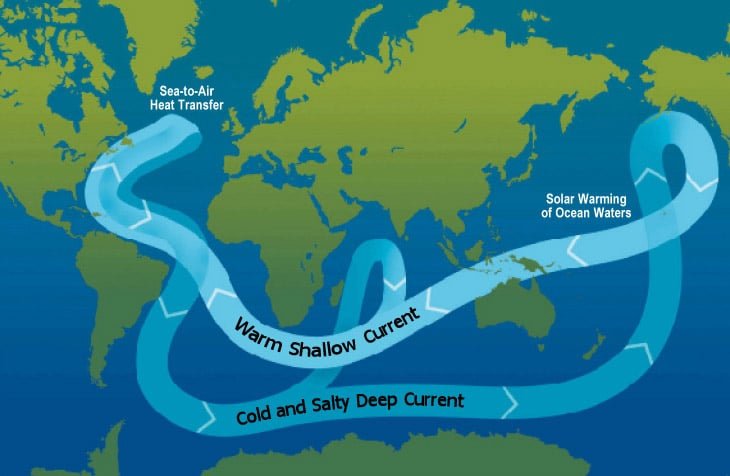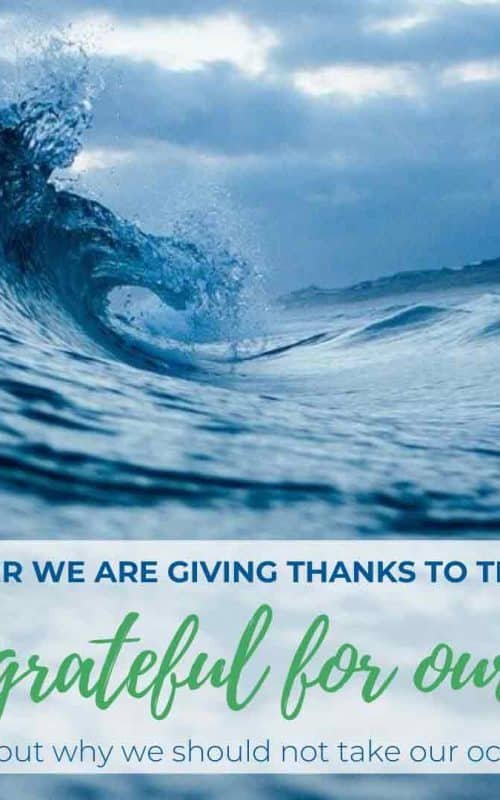We have many things to be grateful for, especially for us over here in Koh Tao. But the thousands of people who dive here probably don’t realise just how important the ocean really is for human kind. So let’s take this opportunity to have a look at why need to give a thought of thanks for the ocean.
Why we should be grateful for the Ocean
Ever heard the expression “No blue no green”? It’s an incredibly true statement used by a multitude of conservationists, marine biologists and climate activists. What does it actually mean and why should we care? Well, the ocean does a lot more for us than just provide diving adventures. It nurtures our planet and provides so much and yet it seems to be forgotten. So here is a short list of reasons to be grateful for our beautiful oceans.

A bloom of phytoplankton off the coast of New Zealand, visible from space.
Photo credit NASA Earth Observatory.
The Ocean is providing us with Oxygen
Yep, it’s not just water out there! A multitude of organisms all contribute to storing carbon dioxide and releasing oxygen back into the atmosphere or the water, through the process of photosynthesis. These include kelp forests, sea grass meadows and a microscopic organism called phytoplankton.
Photosynthesis of phytoplankton in the oceans actually provides more oxygen than the amazon rain forests. In fact just one type of phytoplankton, diatoms, account for 20% of all oxygen production and 40% of all carbon dioxide uptake on Earth! These tiny unsung heroes are the very reason life was able to begin in the first place by creating an oxygen rich atmosphere.
The Ocean is keeping us warm… and cool
The ocean plays a massive role in regulating our planets’ weather and climate. Without the major currents Earth would look rather different. The poles would remain frozen, and equatorial waters would be barren of all life. But luckily that is not the case at all. Instead the currents move both cold and warm water away from their sources and are distributed throughout the oceans.

World map demonstrating major heat transferring currents
Photo credit U.S Global Change Research Programme.
The majority of the radiation from the sun’s heat is absorbed by the ocean, in particular at the equator. This heated water is carried away to the poles acting like conveyer belts to heat colder regions and cooling down the tropics. Without these currents there would be an incredibly uneven distribution of solar radiation reaching the earths surface, and life as we know it would cease to exist.
The Ocean is feeding us
The ocean provides over 1 billion people with protein and accounts for 15% of all consumed protein, in developing countries this percentage is even higher, with some communities solely relying on the ocean. Fisheries are still important to the economy and can act as routes of connection between communities through trade.
Today, humans have developed methods to catch up to 200 billion pounds of fish. But its not just fish and other marine creatures, there is an extensive array of marine plants that have been harvested throughout the years. Seaweeds like kombu, wakame and dulse are all good sources of fibre, and are slowly being grown on a commercial level to meet the growing food demands of an increasing global population.

Woman selling fish in her local market
Photo credit Canva.
The Ocean brings us happiness!
There are countless studies that prove being near a large body of water or spending time immersed in water, can actually have long lasting positive effects. Even just having a sea view has proven to improve your mental health.
“Increased views of blue space is significantly associated with lower levels of psychological distress” , said Pearson, assistant professor of health geography and a member of MSU’s Water Science Network. That is all the convincing I need to make sure I end up in a beach house for the rest of my life!
Living near the sea not only improves mental health, it also improves your physical health. The increased air quality, more direct sunlight and exercise, or just enjoying the coast, all contribute to better health. But an interesting theory has been put forward that being around “blue spaces” actually has restorative psychological powers. So much so, that Dr Mathew White, a senior lecturer at the University of Exeter and an environmental psychologist with BlueHealth, believes that utilising blue spaces will be a common practice for all mental health services in the near future.
So what about us here at Master Divers? Why are we grateful for the ocean?
For myself, it’s an environment I feel completely relaxed in. No matter how bad my day may seem to be, once I’m in the water everything is ok again. But what do my colleagues think?
“It gives me a job and enables me to live on a tropical island, and I have seen creatures in the wild most people only get to see on David Attenborough shows.”
“I am grateful for nudibranches, they are legit my favourite things.”
“A lot of people, including myself, have used water to heal themselves via physical therapy, bringing me from a wheelchair to walking again. As someone who for some time did not think they would be as mobile as they are today, I see the ocean as a safe and healing place for me.”
This list really could go on and on. Whether it is the air you breathe or the food you eat, we are all connected to the ocean one way or another. We need to stop taking the ocean for granted, it may seem unchanging and constant but we are challenging that. The human race can’t afford to find out if we really can survive without healthy oceans, instead we must protect it at all costs.
Show a little gratitude and play your part, pick up some rubbish on the beach or source sustainable fish. The next time you’re daydreaming next to the water have a think… How can you show your gratitude to the ocean?

